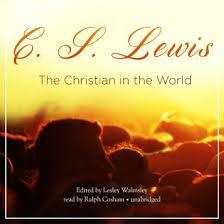- Biblia
- Leer la Biblia
- Versiones de la Biblia
- Verso del dia
- Planes de lectura
- Versos por tema
- Books of the Bible
- Imágenes De La Biblia
- Estudio
- Comentarios
- Concordancias
- Diccionarios bíblicos
- Enciclopedias bíblicas
- Sermones
- Bible Atlas & Maps
- BP Wiki
- Devocionales
- Devocionales de hoy
- Light of the World
- Todos los devocionales
- Inspirational Quotes
- Más
- Picture Quotes
- Videos
- Inspirador
- Estudio Bíblico
- Lo que dice la Biblia
- Bible Q&As
- Daily Bread
- Bible by Genre
- Bible Stories
- Random Bible Verse
- Comunidad
- Store
The Christian in the World
by C.S. Lewis
This volume of short essays and other pieces by C. S.Lewis is part of a larger collection, C. S. Lewis: Essay Collection and Other Short Pieces. In addition to his many books, letters, and poems, C. S. Lewis wrote a great number of essays and shorter pieces on various subjects. He wrote extensively on Christian theology and the defense of faith, but also on ethical issues and the nature of literature and storytelling. Within these pages is a treasure trove of Lewis' reflections on diverse topics.
This volume includes
1. "Why I Am Not a Pacifist"
2. "Dangers of National Repentance"
3. "Two Ways with the Self"
4. "Meditation on the Third Commandment"
5. "On Ethics"
6. "Three Kinds of Men"
7. "Answers to Questions on Christianity"
8. "The Laws of Nature"
9. "Membership"
10. "The Sermon and the Lunch"
11. "Scraps"
12. "After Priggery - What?"
13. "Man or Rabbit?"
14. "The Trouble with ‘X' ..."
15. "On Living in an Atomic Age"
16. "Lilies That Fester"
17. "Good Work and Good Works"
18. "A Slip of the Tongue"
19. "We Have No "Right to Happiness"
©2013 Blackstone Audio, Inc.; 1980 C. S. Lewis
This volume includes
1. "Why I Am Not a Pacifist"
2. "Dangers of National Repentance"
3. "Two Ways with the Self"
4. "Meditation on the Third Commandment"
5. "On Ethics"
6. "Three Kinds of Men"
7. "Answers to Questions on Christianity"
8. "The Laws of Nature"
9. "Membership"
10. "The Sermon and the Lunch"
11. "Scraps"
12. "After Priggery - What?"
13. "Man or Rabbit?"
14. "The Trouble with ‘X' ..."
15. "On Living in an Atomic Age"
16. "Lilies That Fester"
17. "Good Work and Good Works"
18. "A Slip of the Tongue"
19. "We Have No "Right to Happiness"
©2013 Blackstone Audio, Inc.; 1980 C. S. Lewis
BUY NOW
Audiobook
Published 2013 by Blackstone Audio
Suscribir
© 2025 Bibleportal.com Reservados todos los derechos.

Clive Staples Lewis was born in Ireland, in Belfast on 29 November 1898. His mother was a devout Christian and made efforts to influence his beliefs. When she died in his early youth her influence waned and Lewis was subject to the musings and mutterings of his friends who were decidedly agnostic and atheistic. It would not be until later, in a moment of clear rationality that he first came to a belief in God and later became a Christian.
C. S. Lewis volunteered for the army in 1917 and was wounded in the trenches in World War I. After the war, he attended university at Oxford. Soon, he found himself on the faculty of Magdalen College where he taught Mediaeval and Renaissance English.
Throughout his academic career he wrote clearly on the topic of religion. His most famous works include the Screwtape Letters and the Chronicles of Narnia. The atmosphere at Oxford and Cambridge tended to skepticism. Lewis used this skepticism as a foil. He intelligently saw Christianity as a necessary fact that could be seen clearly in science.
"Surprised by Joy" is Lewis's autobiography chronicling his reluctant conversion from atheism to Christianity in 1931.
... Show more